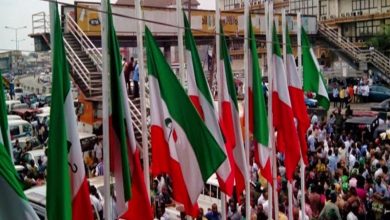

The federal government through the Ministry of Industry, Trade and Investment has commenced the disbursement of the Presidential Conditional Grant Scheme to verified applicants.
The disbursement is coming barely two months after the agreement for the loan was sealed between the federal government and the Bank of Industry.
In a progress report posted on the trade minister’s official X (formerly Twitter) handle on Tuesday, Doris Aniete stated that an unspecified number of beneficiaries have received their grants, adding that by Friday, April 19, another significant disbursement will be made to a substantial number of verified applicants.
She said, “We are pleased to inform you that the disbursement process for the Presidential Conditional Grant Programme has officially commenced. Some beneficiaries have already received their grants, marking the beginning of our phased disbursement strategy.”
“By Friday, 19th April 2024, a significant disbursement will be made to a substantial number of verified applicants. It is essential to understand that disbursements are ongoing, and not all applicants will receive their grants on this initial date. However, rest assured that all verified applicants will eventually receive their grants in subsequent phases.”
Exposed!! Popular Abuja doctor revealed how men can naturally and permanently cure poor erection, quick ejaculation, small and shameful manhood without side effects. Even if you are hypertensive or diabetic . Stop the use of hard drugs for sex!! It kills!
The Federal Government, through the Ministry of Industry, Trade and Investment, had in February signed three agreements with the Bank of Industry that would unlock over N200bn funding for businesses in Nigeria.
The first agreement enables both parties to establish the FGN Micro, Small and Medium Enterprises Intervention Fund in the sum of N75bn, while the second agreement is for the the N50bn Presidential Conditional Grant Scheme (PCGS).
The scheme which is also known as the Nano Business Grant Support Section of the Presidential Palliative Program of the federal government would allow the sum of N50bn to be deposited as Grant and with BOI from time to time.
The third agreement would enable both parties to set up the N75bn FGN Manufacturing Sector Fund to be deposited by FMITI with BOI from time to time for the purpose of financing projects and activities falling within the parameters of the Fund.
Under the first agreement which is the N75bn MSMEs fund, the amount would be used to finance approved projects to support micro, small and medium-scale enterprises and serve as a cushion against the high cost of production, marketing and distribution of products arising mainly from infrastructure deficiencies and other ancillary factors involving MSMEs in Nigeria.
The operation and management of the Fund would be the responsibility of BOI in accordance with the terms and conditions of the agreement.
Under the second agreement which is the N50bn Presidential Conditional Grant Scheme (PCGS), the amount would help to cushion the negative impact of the removal of fuel subsidy by the FGN, and the resulting increase in the pump prices of petroleum products in Nigeria on businesses.
The removal of subsidy had led to some unintended economic hardship on the citizenry of Nigeria.
In a bid to cushion the effect of the fuel subsidy removal, President Bola Tinubu had in a national broadcast made on 31st of July, 2023 introduced palliative measures to support families and businesses affected by the fuel subsidy removal.
The federal government, through the Trade Ministry, is establishing the Nano Business Grant Support Section of the Presidential Palliative Programme to protect and sustain the income of vulnerable nano enterprises from the shock of the economic downturn.
This is in furtherance of the attainment of economic revitalisation, employment preservation and generation, growth, and development of nano businesses throughout Nigeria.
The ministry has a target of at least 1,000 nano business owners in each of the 774 local governments across the country and the six council areas in the FCT, especially women and youth, thereby supporting the growth of nano businesses and improving the social well-being of households across the Nation between now and March 2024.
As the custodian of the Fund, BOI would leverage all its applicable expertise, business profiling and field infrastructure, branch and agent networks, partnerships, and plug-ins across financial institutions nationwide, technology and data management systems, third-party partnerships and institutional support.
Some of the target sectors/businesses include Trade (single retail marketers, corner shop owners, petty traders, market men, women, and youths in open market spaces); Food Services (Food and Vegetables Vendors), ICT (business centers operators, battery chargers, recharge cards vendors, call center agents); Transportation (Wheelbarrow Pushers, independent dispatch riders): Artisans (Vulcanizers, Shoe repairers, painters);Creatives (Makeup artists, fashion designers, drycleaners), and any other sectors as may be identified by the ministry.
For the third agreement, which is in respect to the FGN Manufacturing Sector Fund, the government’s target is to provide support for businesses in the manufacturing sector of the Nigerian economy nationwide.
This is in furtherance of the attainment of economic revitalisation, reduction in the cost of production, employment generation, and inclusive growth and development of the manufacturing sector throughout the Federal Republic of Nigeria.
As custodian of the Fund, BOI would leverage on all its applicable expertise, business profiling and field infrastructure, branch and agent networks, partnerships and plug-ins across financial institutions nationwide, technology and data management systems, disbursement and collections infrastructure where applicable, third-party partnerships and institutional support where effective to the target beneficiaries across all states in Nigeria.
The Fund would be utilized to support eligible manufacturing companies and afford same a cushion against the high and rising costs of production, marketing and distribution of products arising from, among others, infrastructural deficiencies and other ancillary factors affecting manufacturers and the manufacturing sector in Nigeria.
The operation and management of the Fund would be the responsibility of BOI in accordance with the terms and conditions of the agreement.




